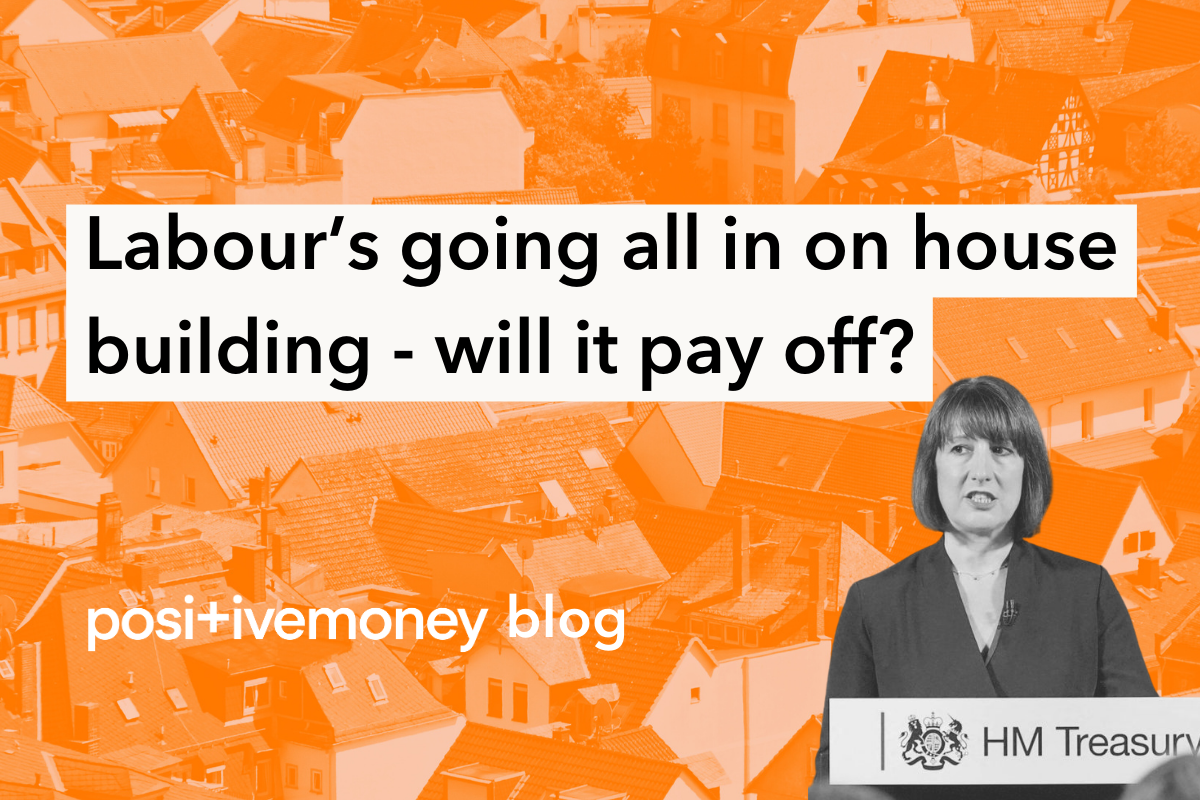
GlobalUK
19 June 2025
New Chancellor Rachel Reeves has promised to prioritise planning reform and house building, but will this alone deliver the change we need? We argue for the importance of examining the root causes of the housing crisis and advocating for structural solutions.
Safe, secure homes are the foundations of healthy lives. But too many people in Britain simply don’t have access to them, whether they’re part of the record number of people made homeless, priced out of buying, or facing extortionate rents that force them to choose between heating and eating.
Promisingly, new Secretary of State for Housing, Communities and Local Government Angela Rayner has spoken of putting "social and council housing at the heart of Labour’s secure homes plan". However, the new government’s housing strategy appears focused overwhelmingly on encouraging the private sector to build new homes, an aim that forms a core component of Labour’s strategy to grow the economy. But as our research has shown, building alone won’t go far enough to solve the housing crisis, because decades of financial deregulation have turned our houses into assets, not homes.
Undoubtedly we need more social homes, and have called for a mass social house building programme as part of Shelter's campaign. However, more funding for building council homes has disappointingly been ruled out, with the new government instead asserting that they expect the private sector to build social homes, even when they've repeatedly failed to meet requirements to deliver affordable homes over recent years. But particularly outside of social housing, conversations centred solely on building paint an incomplete picture of what has caused the housing crisis.
In 2017, then-Chancellor Philip Hammond set a target of building 300,000 new homes a year by the mid-2020s. This target has been revived by the new government, even though such volumes of new homes have only previously been delivered in the UK during periods with ambitious public building programmes. However, the government's own analysis shows that even if this target had been met each year since 1996, the average house today would only be 7% cheaper - a mere drop in the ocean compared to the 120% increase in real house prices over this period. This is not to mention that every region of England has seen its surplus building stock grow since 2001, and that the scale of house building Labour is targeting would most likely blast through the UK's carbon budget.
Clearly, surging house prices are the result of more than just insufficient supply. In 2019, even the Bank of England admitted that: “relative scarcity of housing has played almost no role at the national level since 2000” in soaring prices. So if supply isn’t the answer, what is?
The roots of our housing crisis lie in decades of policy decisions which have turned our homes into vehicles for accumulating wealth.
Governments have scrapped important financial regulations, making lending into the property market easy and profitable, allowing banks to offer riskier, more debt-laden mortgages. Banks create money when they make these loans, flooding the housing market with funds and pushing up prices.
Alongside liberalising the financial sector, governments of the last 40 years have deliberately made becoming a landlord easier and more profitable. The creation of Buy-to-Let mortgages, retaining of certain tax incentives, lifting restrictions on overseas investment and limiting tenants’ rights have served to consistently increase the power and growth of landlords, and incentivised the banking sector to continue to prioritise mortgage lending.
As with other assets, house prices have also been pushed up by low interest rates. The Bank of England’s recent Quantitative Easing programme has only further reinforced this process, interacting with government schemes, such as stamp duty relief and low deposit mortgages, and the regulatory landscape to create a toxic feedback loop between finance and house prices.
So if we can’t just build our way out of the crisis, what can we do?
Firstly, the government needs to give the Bank of England a specific mandate to tackle house price inflation; a recommendation two thirds of the public support. This should happen in tandem with significant reforms to our taxation system to shrink demand for housing as a speculative asset. Fair taxes on owners of multiple properties, taxing capital gains from property the same way we tax work, an end to financial incentives for landlords, and higher taxes for overseas investors are crucial steps to deflate the housing bubble.
We also need policies that provide relief for those most acutely suffering from our broken housing system right now. On top of increasing the stock of social homes, we need to lift the burden of stress on those in the private rented sector by providing them with greater rights and protections, more secure tenancies, and rent controls. With the failure to pass the (much watered down) Renters Reform Bill before the calling of a general election, this only increases the urgency for Labour to act, and go beyond their manifesto pledges to truly protect renters.
Crucially, we need to look at better ways to use existing housing more efficiently. Social homes are the most appropriate tenure for nearly half of those in need, but policies like Right to Buy have drastically shrunk their availability. Right to Buy has contributed to the financialisation of the housing market by turning 2 million social homes into private assets, many of which now sit within the private rented sector. While we agree that building more social homes is important, there also needs to be policy changes like scrapping Right to Buy, something advocated for even by property company JLL. This new government also desperately needs to scale up schemes to allow councils to buy back homes from the private rental sector, regrowing our stock of social homes, without building; an idea explored at our parliamentary housing event in May.
Building more homes without wider policy reform is just papering over the cracks of a broken system. Not only does it fail to get to the root causes of financialisation spurred on by our money and banking system, but it also doesn’t address the deep levels of insecurity felt by so many renters - a group that has doubled in size since 2001.
We need homes not assets, and Labour need to be bold enough to get us there. Only by taking power and incentives away from landlords, and offering greater protection for tenants, can we create a housing system that works for all, not just a wealthy few.
Find out more about our work on housing here.
Sign-up to our mailing list for regular updates on our work fighting for a money and banking system that enables a fair, sustainable, and democratic economy.
